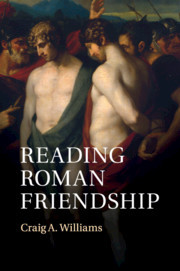Description
Reading Roman Friendship
Author: Williams Craig A.
A comprehensive study of friendship in ancient Rome attentive to gender and social status, language and the commemoration of the dead.
Language: English
Subject for Reading Roman Friendship:
Approximative price 39.35 €
In Print (Delivery period: 14 days).
Add to cart
Reading Roman Friendship
Publication date: 05-2020
Support: Print on demand
Publication date: 05-2020
Support: Print on demand
Approximative price 85.89 €
In Print (Delivery period: 14 days).
Add to cart
Reading roman friendship
Publication date: 10-2012
390 p. · 15.7x22.9 cm · Hardback
Publication date: 10-2012
390 p. · 15.7x22.9 cm · Hardback
Description
/li>Contents
/li>Biography
/li>
This book invites us to approach friendship not as something that simply is, but as something performed in and through language. Roman friendship is read across a wide spectrum of Latin texts, from Catullus' poetry to Petronius' Satyricon to the philosophical writings of Cicero and Seneca, from letters exchanged by the Emperor Marcus Aurelius and his beloved teacher Fronto, to those written by men and women at an outpost in northern Britain. One of the most innovative features of this study is the equal attention it pays to Latin literature and to inscriptions carved in stone across the Roman Empire. What emerges is a richly varied and perhaps surprising picture. Hundreds of epitaphs, commissioned by men and women, citizens and slaves, record the commemoration of friends, which is of equal importance to understanding Roman friendship as Cicero's influential essay De amicitia.
Introduction: reading Roman friendship; 1. Men and women; 2. Love and friendship I: questions and themes; 3. Love and friendship II: authors and texts; 4. Friendship and death: the culture of commemoration.
Craig A. Williams is Professor of Classics at Brooklyn College and the Graduate Center of the City University of New York, and in 2006 he was awarded Brooklyn College's Leonard and Claire Tow Endowed Professorship. He is the author of the acclaimed Roman Homosexuality, 2nd edition (2010), an introduction and commentary in Martial: Epigrams, Book Two (2004) and numerous articles and reviews on Latin literature and Roman culture.
© 2024 LAVOISIER S.A.S.




